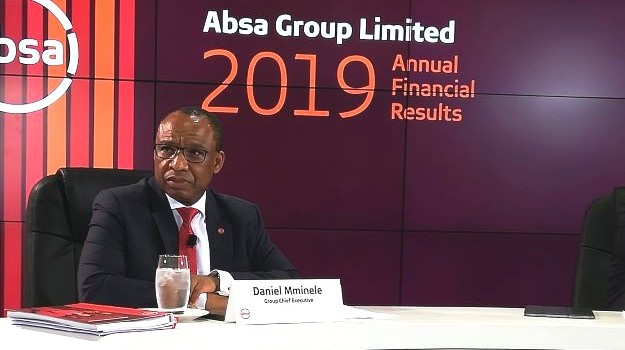


Absa CEO, Daniel Mminele said the bak is winding up the last few elements of its separation from Barclays.
- The process of separating from Barclays is now 99% complete
- The separation began in 2017 when Barclays reduced its exposure in Absa to 14.9%.
- Absa CEO said the bank’s ability to determine its own destiny is already bearing fruits
Absa says it can confidently declare that its separation from its former UK parent company, Barclays, is as good as complete, three years after two started the process of parting their ways.
The banking group said on Monday that save for few “minor ‘mop-up’ activity projects”, the last steps of the separation have been completed and the bank now owns and control all its systems and infrastructure across the continent. Barclays contributed R12.6 billion in 2017 towards the separation programme, which enabled Absa to finance the migration of its IT systems and brand projects to SA. The group said the separation occurred within budget, and it will be capital and cash flow neutral.
Determining its own destiny
“It’s essentially 99% complete. We are almost there because of six outstanding projects. Three are mop-up activities and the other three we are comfortable that we’ll wrap up in a couple of months, which allows us to declare quite confidently that we are substantially complete with the programme,” said Absa Group Chief Executive Daniel Mminele.
Being part of Barclays had its benefits and downsides for Absa. Barclays’ credit risk appetite proved to be less than what Absa’s peers in SA were prepared to take, which constrained the red bank from aggressively growing its lending book, especially in the unsecured lending space.
“If you are part of a large banking group, you are very embedded in terms of systems, policies, processes, risk appetite. So, what this separation indeed does is it opens a way for us to emerge from this chapter as a proudly independent African bank. We have a good foundation to build on and we are on full control now to make decisions that are in the best interests of our clients,” said Mminele.
He said before Covid-19, Absa’s ability to determine its own destiny was bearing fruits as the group clawed back previously lost market share. However, because of the disruption that Covid-19 has caused in the market, Mminele said the group will now focus on preserving cash rather than growing market share.
He said the group has started looking at what the post-Covid-19 environment is going to look to change customer preferences and what this means for Absa’s digital ambitions.
“Those things are now going to occasion a much broader review of the strategy than we initially envisaged,” said Mminele.
A lengthy and ‘complex’ separation
The separation began in 2017, a year after Barclays which was previously a majority shareholder at Absa, holding a 62.3% stake moved to become a to a minority shareholder. In 2017, the British bank reduced its exposure in Absa to 14.9%.
Absa chairperson Wendy Lucas-Bull narrated in the 2019 annual general meeting how Absa found out through an article in London’s Financial Times in 2016 that Barclays was planning to initiate a divorce, putting an end to an 11-year relationship that the two forged when the British bank acquired 55.5% of Absa Group in 2005.
Absa calls the separation “one of the largest and most complex corporate programmes of its kind” it has ever had to embark on. It included 276 separate projects, of which 270 are now complete. The two biggest milestones, moving Absa’s banking platform used by its African subsidiaries from the UK to SA, and changing Barclays-branded banks as Absa in the rest of Africa, were respectively completed in April 2019 and February 2020. The bank said more than 1 000 branches have been rebranded.

